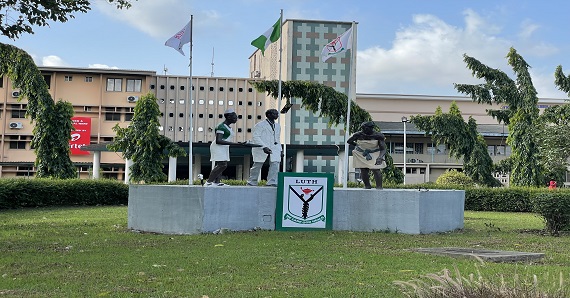
LUTH starts a bone marrow transplant to treat sickle cell disease.
In order to cure sickle cell illness, the Lagos University Teaching Hospital (LUTH) and the Sickle Cell Foundation Nigeria (SCFN) have launched an excellent, secure bone marrow transplant procedure that satisfies international criteria.
This was announced Friday in Lagos through a joint statement from the National Director of Sickle Cell Foundation Nigeria (SCFN), Dr. Annette Akinsete, and the Chief Medical Director (CMD), Prof. Wasiu Adeyemo, of the hospital.
It stated that Nigeria had the highest incidence of sickle cell disease globally and that those who have the condition have shortened life expectancies, major organ damage, and potentially fatal consequences starting in early childhood.
"A bone marrow transplant program was established at LUTH by SCFN and LUTH in recognition of the gaps in care for individuals affected by the disease in Nigeria," the statement read.
"A post-transplant clinic was first established in 2019, the first in sub-Saharan Africa, to provide post-transplant care to patients who had travelled to other countries for bone marrow or stem cell transplants, in anticipation of a locally tailored and economical bone marrow transplant program in Nigeria.
"Transcranial Doppler screening in children to identify those at risk of stroke, penicillin prophylaxis, and newborn screening are all part of the establishment of comprehensive care programs."
Chronic blood transfusion therapy comes next, and the percentage of children who survive into adulthood has increased due to the growing use of hydroxyurea therapy.
However, the percentage of persons who live to be older has not increased, particularly for those who are most badly impacted.
According to the statement, "a bone marrow transplant using a family member as a donor is an established cure for this disease."
The statement claims that known risks following a bone marrow transplant include infection, graft-versus-host disease (a condition in which the patient's own cells fight them), infertility, and even death.
It described how, in the past 20 years, the method has undergone significant improvement to guarantee positive results and minimise difficulties.
A bone marrow transplant is currently recognised as a treatment option for adults and children with severe sickle cell disease. A multidisciplinary team approach is necessary for the difficult surgery of bone marrow transplantation, which entails therapy and continuous monitoring for approximately 12 months,” it said.
It stated that Prof. Adetola Kassim of Vanderbilt University Medical Center's scientific knowledge and leadership had guided the program. It emphasised that Prof. Josudela Fuente of Imperial College London Healthcare NHS Trust UK joined the team in 2022 to further strengthen the program's expertise.
The first group of patients was admitted in the latter week of August 2024 and is presently receiving bone marrow transplants at LUTH, according to the announcement.
In order to prepare them for the infusion of bone marrow stem cells that were extracted from family donors, processed, and administered on September 17 and September 19, 2024, they underwent a treatment regimen that included exchange blood transfusions, chemotherapy, and anti-infective prophylaxis.
"In the transplant facility at LUTH, both patients are presently receiving rapid post-transplant care.
"We would like to thank patients and their families, the board of directors, the Lagos State government, Chevron, our collaborative and technical partners, and other hard-working individuals who worked nonstop to make this program a success."





